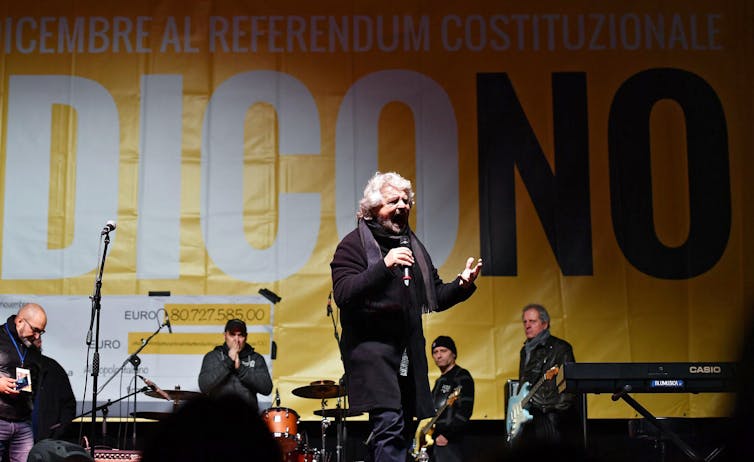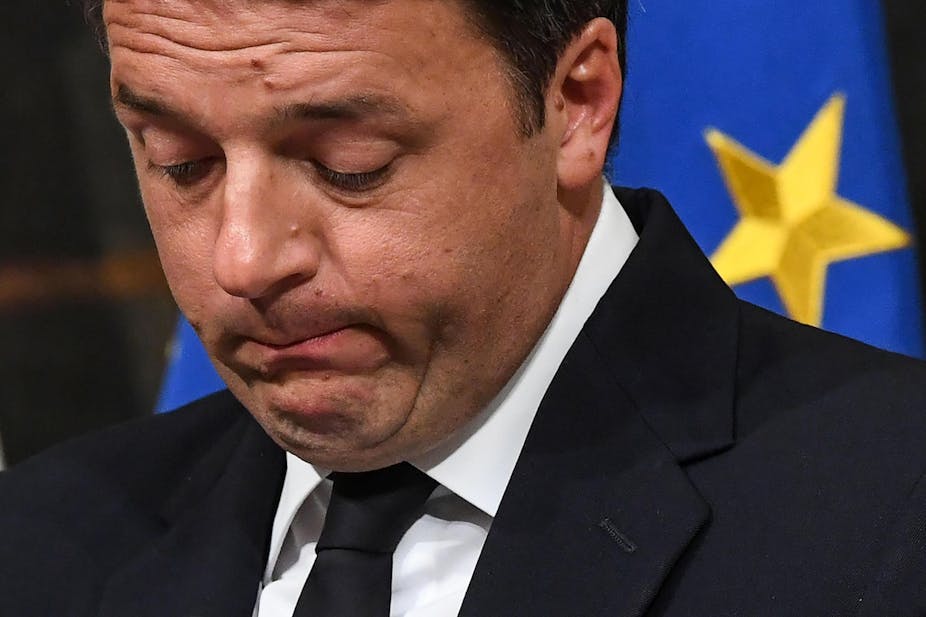Italian prime minister Matteo Renzi has carried out his promise to resign after losing a referendum on his country’s constitution. This brings an end to a tenure that lasted just 1,000 days.
In a moving speech, Renzi said: “I have lost … I take full responsibility for this result.” His decision marked a break from the post-war norm in Italian politics. Renzi was actually seeing through on his promise. “This time, when you lose you step down,” he said. “You do not carry on as though nothing has happened.”
The 65.5% Italians who voted in this referendum not only rejected the proposed constitutional change, they completely annihilated it. An enormous 59.1% voted No and 40.9% voted Yes, siding with Renzi. Only three regions voted Yes: Tuscany, Emilia Romagna and South Tyrol – two of which are traditional strongholds of Renzi’s party.
The decisiveness of the result has completely shocked the nation. While a No vote was always a possibility, the margin was expected to be close. Back in April, the Yes camp was seen to have an advantage.
In the end, the No supporters seemed to have come from a far wider coalition of voters than expected – including people from the left and even senior figures in Renzi’s own party. Indeed, they were so broadly spread across the political spectrum that it has been said there were no winners in this referendum. No single political party can claim the victory. If a winner were to be declared, it would surely be political participation – even Italian democracy – given the extraordinarily high turnout.
Why No?
But while many have sought to portray the Italian referendum as the latest battle in the war between populists and the establishment, that would be an oversimplification of what has happened to Renzi.

Yes, this was an anti-establishment vote, but it was not necessarily an expression of populism. The No vote was intrinsically linked to Renzi – it was not a sign of support for any of his rivals, but a rejection for what he stands for.
The trouble was, Renzi was never actually elected by the people to the job of prime minister. He ousted former prime minister and PD politician Enrico Letta in February 2014 after he lost the support of his governing coalition. Consequently, the people have never really had a chance to vote – or not – for Renzi.
During his short time running the country, Renzi has achieved many important things and put Italy back on the right road. But he has not tackled many of the more urgent questions and issues (such as electoral reform).
Renzi wanted to change Italy but turned this vote into a plebiscite on him and his way of governing. And this, according to political scientist Ilvo Diamanti, was his mistake. By personalising the referendum, Renzi alienated potential supporters of his reform. He made it look like he was playing with the Italian constitution and clearly Italians were wary of changing the rules of the political game. As the Economist recently pointed out, Renzi’s proposed reforms could create “an elected strongman” – a worrying prospect for a country that produced Benito Mussolini and Silvio Berlusconi.
Renzi has also governed in a way that started to bother many – not only those who make up the various opposition parties, such as the Northern League and the Five Star Movement, but also those in his own party. His use of Twitter and his cavalier manner have made him look like a dynamic force on the European stage – a leader who wants to get Italy out of a hole – but at home, his tactics have backfired. For Italian voters, Renzi’s media persona is all too reminiscent of former prime minister Silvio Berlusconi.
The result of the referendum may have been decisive, but the fallout is a major unknown. It will now be up to president Sergio Mattarella to guide the country through this delicate post-Renzi moment.
The markets’ initial worries have so far proved unfounded and this referendum result must not be analysed as part of a wave of populism but rather as a wave of anti-establishment sentiment in Italy. Although it is clear that this Italian result will not help to solve the turmoil in Europe, the referendum – and the Italian political situation in general – are not necessarily the latest example of populist triumph.

